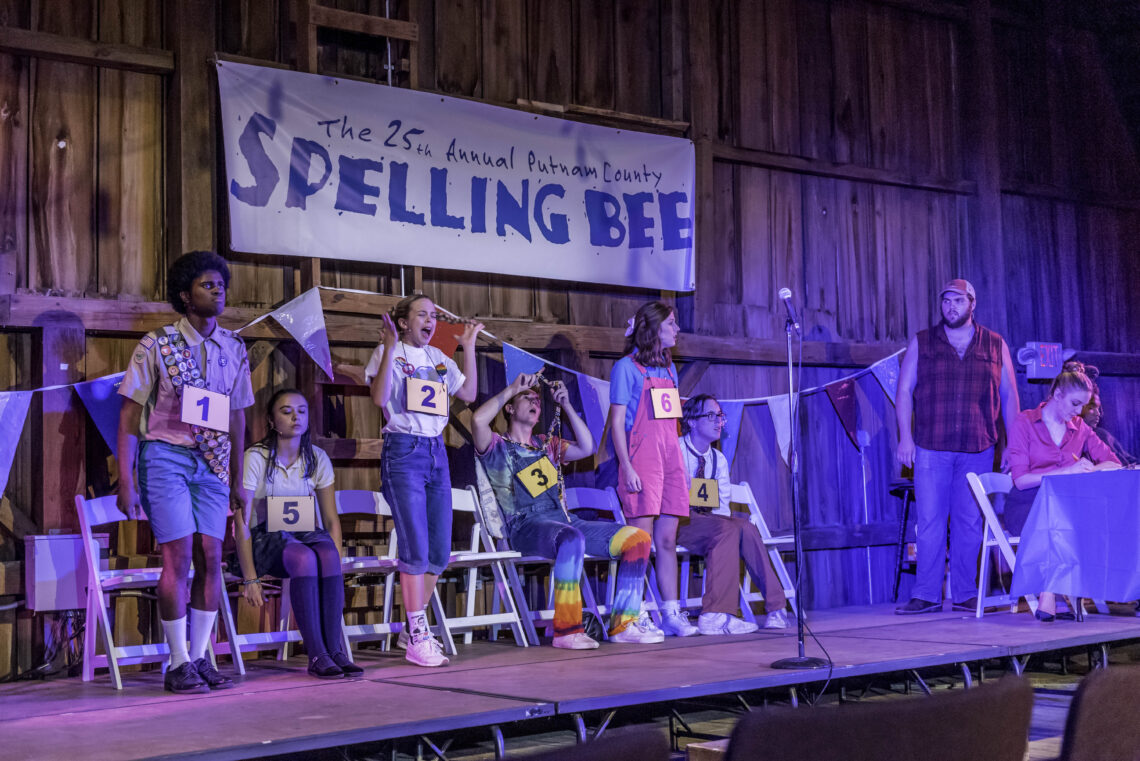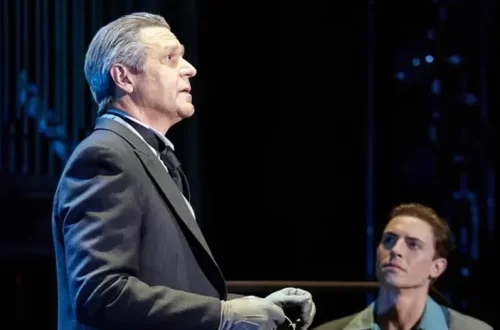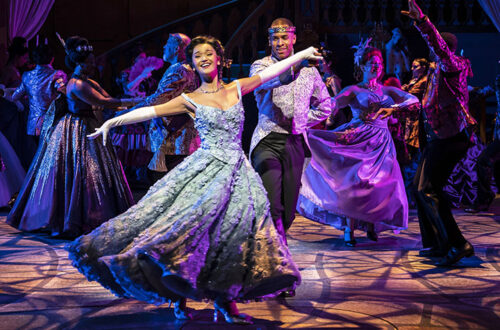There is an eerie silence in the room. In the center of an office in the Smith Memorial Hall, you stand before two lyric theatre faculty members and one accompanist. You eagerly await the moment the accompanist begins playing your music: two classical pieces, two musical theatre pieces and one monologue. Hundreds of hopeful applicants audition every year. Only fifteen are ultimately accepted – fifteen optimistic college freshmen preparing to enter the “cut-throat” world of professional theatre.
Lyric Theatre @ Illinois (LTI) is an all-encompassing musical theatre program under the College of Fine & Applied Arts at the University of Illinois at Urbana-Champaign. The program places a heavy emphasis on sung theatre through both classical and contemporary vocal training, though students are also coached in acting and dance technique.
Co-directors of Lyric Theatre @ Illinois Julie and Nathan Gunn founded the program eight years ago as a replacement for the university’s opera department. Julie Gunn serves the program as professor of accompaniment, while Nathan Gunn serves as a professor of voice. When developing the foundation for LTI, they say they contacted peers from both sides of the industry (musical theatre and opera) and questioned what they felt was missing in lyric theatre education. They say the general consensus was increased vocal training across a multitude of genres. Nathan Gunn comments on the comprehensive nature of the program and the importance of teaching both classical and contemporary vocal styles to future performers.
“Sung theatre is a wide variety of things,” Nathan Gunn explained. “There are constantly new operas being written and pieces that fall in between operas and musicals. What we think is important is creating a healthy base for everybody. We focus on both mental and physical wellness and flexibility, so students are trained to use their instrument in a way that will last them their entire lives. Those skills are really important for our students to learn so that they can have successful careers and discover new styles that they may not have originally been interested in.”
Nathan Gunn says many musical theatre programs are offered through the theatre department, while a select number of colleges – including the University of Illinois – offer the major through the School of Music. He explains that the foundation of Lyric Theatre @ Illinois heavily relies on core music curriculum, with classes ranging from piano to music theory. Students are required to take four semesters of musicianship, where they learn to sight-sing and dictate harmonic and melodic progressions. With such skills in their professional portfolio, they are able to market themselves as not only performers, but musicians when they graduate from the university.
Clinical Associate Professor for Lyric Theatre @ Illinois Sarah Wigley has been with the program since it was first introduced on campus. She is a resident director for many mainstage productions produced by LTI and serves as a contemporary voice specialist. Wigley comments on her experience building the program into what it is today.
“I thought it was really a shame that nobody was preparing [students] to do both… Either you get a BFA in musical theatre or you get a voice performance degree,” Wigley said. “When I accepted this position, I got to be part of building something that trains singers to understand their voices and sing healthfully. There is no problem crossing between different genres.”
With such a large focus on vocal performance, lyric theatre combines with other programs on campus to provide their students with all the resources necessary for a successful career in the arts: “One thing that makes us really special is how much collaboration we do with other fine arts departments on campus, like acting and dance,” Wigley said. “For instance, lyric theatre dance is in collaboration with the dance department here at the University of Illinois, so students are trained in all types of dancing on stage from baroque opera to A Chorus Line. We take from all parts of the campus to allow our students to grow to their fullest potential.”
Lyric Theatre @ Illinois is a resident producer of the Krannert Center, where many industry professionals hold masterclasses for students preparing to graduate and begin their careers outside of the university. The Krannert Center works closely with LTI to build connections between students and guest visitors such as vocalists Renee Fleming, Susan Graham, and Larry Brownlee.
To utilize their training, students must audition for the lyric theatre productions each semester. While they are often geared towards lyric theatre students, Wigley says they are open for anyone to audition, including graduate students. She says that about half of the students involved with lyric theatre productions are from various graduate programs. Wigley explains the structure of a typical school year in terms of the shows produced by Lyric Theatre @ Illinois.
“We present three big mainstage productions every year at the Tryon Festival Theatre located in the Krannert Center for the Performing Arts,” Wigley explained. “We try to make those as versatile as possible, so usually there’s one really big opera, one contemporary or baroque chamber piece and finally one big, huge musical.”
There are several smaller shows produced by LTI throughout the year, which ensure that all students have the opportunity to perform even if they are not cast in a mainstage production. Lyric Theatre Under the Stars is an annual performance at the Allerton Park & Retreat Center which combines various opera and musical theatre pieces into one musical revue. The show is performed outdoors, which provides participating students and audiences alike with a unique theatrical experience. These smaller productions occur simultaneously with the mainstage shows.
“We always do one new work, which is really cool about us,” Wigley said. “We have a lot of composers and librettos from New York and Paris… from all over the world who come in for a couple of weeks and premiere some pieces. An original work called p r i s m won the Pulitzer Prize and we were the first place to premiere it three years ago. The composer came and worked with our students on the production before taking it back to New York.”
Every production is its own endeavor, with nearly 150 individuals working from various departments across campus on each show. “Just to be able to make the costumes, make the sound work, play the instruments in the orchestra, sing the parts… It’s a huge influx of talent,” Nathan Gunn said. “All of those people involved in the process create something special together. If you’re looking at a score, it’s just a black and white piece of paper. It takes all of those people to actually bring it to life, and I think that’s an amazing thing.”
Emily Naud is a current senior in the lyric theatre program. She first began performing in musical theatre productions early in her childhood, though she did not receive extensive classical training until she reached college. Naud auditioned for the program in 2017 and says she is grateful for the many opportunities lyric theatre has given her over the last four years. She reflects positively on her experience working with the LTI faculty, who she says push her to be the best performer she can be.
“I feel lyric theatre really emphasizes wellness and individuality,” Naud said. “It’s about finding your own little puzzle piece in the theatre industry and what your specific strengths are. In our sophomore year, we get to decide what concentration we want to go into – either creative or performance – and are really able to personalize our college experience.”
Julie Gunn says the program has changed structurally since it was first introduced, particularly expanding performance opportunities for students over the years. Post-graduation, about 56% of students are immediately employed in the arts, with another 31% continuing in graduate programs. In order to make professional auditions more accessible for seniors, the program has “moved towards filming many of [their] shows and creating a presence online.”
“We present an annual senior showcase that is filmed and eventually viewed by all the professionals across the country. It really allows for a much more diverse field of artists being heard coming out of school,” Nathan Gunn explained. “Students don’t have to go to New York to be heard, it’s all done virtually.”
Moving forward, Julie and Nathan Gunn say they hope to make Champaign-Urbana a destination for people to visit if they want to see something they have never seen before. “There are so many people whose lives intersect with lyric theatre and the shows we produce,” Julie Gunn said. “There are so many points of intersection in the stories we tell, which is what keeps our program fresh. We are all learning all the time, and it’s been a huge blessing for me to be part of it.”





